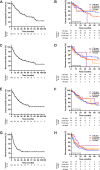Time to surgery is not an oncological risk factor in patients with cholangiocarcinoma undergoing curative-intent liver surgery
- PMID: 38238432
- PMCID: PMC10796920
- DOI: 10.1038/s41598-023-50842-6
Time to surgery is not an oncological risk factor in patients with cholangiocarcinoma undergoing curative-intent liver surgery
Abstract
Surgical resection is the only option to achieve long-term survival in cholangiocellular carcinoma (CCA). Due to limitations of health care systems and unforeseeable events, e.g., the COVID pandemic, the time from diagnosis to surgery (time-to-surgery (TTS)) has gained great interest in malignancies. Thus, we investigated whether TTS is associated with the oncological outcome in patients who underwent surgery for CCA. A cohort of 276 patients undergoing curative-intent surgery for intrahepatic and perihilar CCA excluding individuals with neoadjuvant therapy and perioperative mortality between 2010 and 2021 were eligible for analysis. Patients were grouped according to TTS (≤ 30; 31-60; 61-90; > 90 days) and compared by Kruskal-Wallis-analysis. Survival was compared using Kaplan-Meier analysis and characteristics associated with cancer-specific survival (CSS), recurrence-free survival (RFS) and overall survival (OS) using Cox regressions. The median CSS was 39 months (3-year-CSS = 52%, 5-year-CSS = 42%) and the median RFS 20 months (3-year-CSS = 38%, 5-year-CSS = 33%). In univariable Cox regressions, TTS was not associated with CSS (p = 0.971) or RFS (p = 0.855), respectively. A grouped analysis with respect to TTS (≤ 30 days, n = 106; 31-60 days, n = 134; 61-90 days, n = 44; > 90 days, n = 29) displayed a median CSS of 38, 33, 51 and 41 months and median RFS of 17, 22, 28 and 20 months (p = 0.971 log rank; p = 0.520 log rank). No statistical difference regarding oncological risk factors were observed between the groups. This study is the first comprehensive analysis of TTS in CCA patients. Within a representative European cohort, TTS was not associated with earlier tumor recurrence or reduced CCS.
© 2024. The Author(s).
Conflict of interest statement
Anna Mantas, Dong Liu, Carlos Constantin Otto, Lara Rosaline Heij, Daniel Heise, Philipp Bruners, Sven Arke Lang, Tom Florian Ulmer, Ulf Peter Neumann and Jan Bednarsch declare no competing interests.
Figures


Similar articles
-
The prognostic role of in-hospital transfusion of fresh frozen plasma in patients with cholangiocarcinoma undergoing curative-intent liver surgery.Eur J Surg Oncol. 2022 Mar;48(3):604-614. doi: 10.1016/j.ejso.2021.09.011. Epub 2021 Sep 20. Eur J Surg Oncol. 2022. PMID: 34565633
-
Time to surgery is not an oncological risk factor in HCC patients undergoing liver resection.Langenbecks Arch Surg. 2023 May 10;408(1):187. doi: 10.1007/s00423-023-02922-4. Langenbecks Arch Surg. 2023. PMID: 37160788 Free PMC article.
-
The prognostic role of lymphovascular invasion and lymph node metastasis in perihilar and intrahepatic cholangiocarcinoma.Eur J Surg Oncol. 2019 Aug;45(8):1468-1478. doi: 10.1016/j.ejso.2019.04.019. Epub 2019 Apr 25. Eur J Surg Oncol. 2019. PMID: 31053477
-
Prognostic analysis of patients with combined hepatocellular-cholangiocarcinoma after radical resection: A retrospective multicenter cohort study.World J Gastroenterol. 2022 Nov 7;28(41):5968-5981. doi: 10.3748/wjg.v28.i41.5968. World J Gastroenterol. 2022. PMID: 36405111 Free PMC article. Review.
-
A narrative review of intrahepatic cholangiocarcinoma: a surgical curative option.Chin Clin Oncol. 2023 Apr;12(2):13. doi: 10.21037/cco-22-85. Epub 2023 Mar 27. Chin Clin Oncol. 2023. PMID: 37038053 Review.
References
MeSH terms
Grants and funding
LinkOut - more resources
Full Text Sources
Medical

